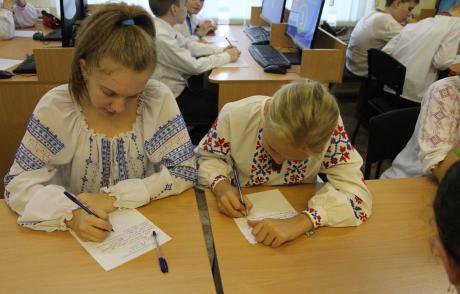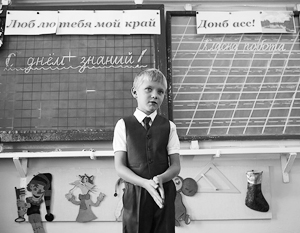What Ukraine's 2017 education law tells us about the war
Since Russia invaded Ukraine I've been doomscrolling the war, trying to hash out what the socialist position is/should be, and hoping it doesn't go nuclear. I've obviously been thinking about it from the perspective of education too. Aside from terrifying images of universities bursting into flames from missile attacks and reports of teachers and students dropping their pencils and picking up guns (and Russian students going to prison for demonstrating), I've been wondering what the education systems are like in Ukraine and Russia and what this conflict looks like from the point of view of schools.
I haven't wanted to opportunistically claim any expertise in their education systems, so everything I say comes with that grain of salt. At the same time, I think it's a good opportunity to start understanding other countries' structures. And maybe even more, I think looking at education can help illuminate features of national/international dynamics that mainstream political and military reporting can't capture.
Indeed, after doing some poking around, I found a fascinating educational history and politics that shows how complicated things in Ukraine have been. In particular, I'm interested in the regional controversy surrounding a new education law in Ukraine passed in 2017.
Watch your language
A new law was signed by Prime Minister Petro Poroshenko in September 2017 and then got extended last year through 2023. Among other things, it increased the percent of Ukraine's GDP devoted to education spending, de-centralized pedagogical and financial control to local agencies, and provided for per-pupil funding such that parents could use public money to send their kids to private school. It all sounds familiar. But when Poroshenko signed it, the law was internationally controversial. Leaders from Hungary, Russia, and a whole council of the European Union got mad. Why?
The big sticking point was language instruction. Specifically, the law ended up strengthening Ukrainian's place as a dominant language in the country. From what I can tell, it wasn't actually that big of a change but it was a change nonetheless. The clause says: “Persons belonging to Ukraine’s ethnic minorities are guaranteed the right to be educated in communal pre-school and primary facilities in their own minority language as well as the state language.”

OpenDemocracy explains that the law calls for:
children from ethnic minorities will be taught for their first four years at school in their own language and take separate Ukrainian language lessons. From the fifth grade, they will have a bilingual education — a clause in the law allows “a couple of subjects” to be taught in an official EU language. Their community’s language and literature will be taught as a separate subject. In Russian-language schools, all subjects apart from Russian language and literature (and in certain cases, connected subjects such as Russian cultural history) will be taught in Ukrainian.
Why did this language provision make so many of Ukraine's neighbors unhappy? To understand that, we have to look back at Ukraine's tenuous international position and it's recent volatile history.
Stabbed in the back?
We know that before the Russian invasion, Ukraine had a kind of worst-of-all-worlds set of international pressures on it. To its west, it had to please NATO-aligned eastern European countries that were European Union members. To its east, it had to make Russia--an authoritarian petrostate on its own against NATO and cozying up to China--happy too. It was a delicate balance that was constantly precarious and led to various wars in 2008 and 2014.
All these parties raised alarms about the language law to advocate for their ethnic minorities residing in Ukraine. The Council of Europe, a parliamentary body of the European Union, put out an official statement denouncing the law. Specifically, it said that "Various neighbouring countries have claimed that this act infringes the rights of persons belonging to national minorities and also raises sensitive legal issues under the Ukrainian legal order. The Assembly deplores the fact that there was no real consultation with representatives of national minorities in Ukraine on the new [law]." Hungary's Prime Minister said the law stabbed Hungary in the back.
RadioFree Europe interviewed a mother on Ukraine's border with Hungary. She said:
"I don't like it. Why? Because, for example, I am a Hungarian. I was studying in a Hungarian school and I want my children also to speak Hungarian," she explained. "Maybe they will move to Hungary or maybe they will go there to earn money. In that case, the Hungarian language will be more useful than Ukrainian, I think."
There's also tension arising from national high school graduation exams (think SATs but more intense, like China's state exam). The exams determine where you go to university. But they're in Ukrainian. So any student speaking another language either fails or doesn't take them at all.
Russian officials agreed with these concerns, but not because they were worried about Hungarian kids getting jobs in Hungary. They were advocating for the Russian-identifying populations in eastern Ukraine. The Russian government issued a statement saying the law was designed to "forcefully establish a mono-ethnic language regime in a multinational state." The Russian claim comes with a little more teeth than the EU's, however, for two reasons.
First, Russians have numbers to back up their complaint. Ethnic Russians made up 17% the Ukrainian population at the time. According to OpenDemocracy, of the 400,000 ethnic minority students attending Ukrainian schools 356,000 of them were Russian. That leaves a small percentage of other minorities (Polish, Hungarian, Slovenian, etc) which aligned with overall demographics of the country.
Second, Russia had significant political skin in the game. The 2017 education law was actually an explicit rewriting of a 2012 education law passed under the more Russian-friendly administration of Viktor Yanukovych. That law permitted the use of multiple languages in schools if an ethnic minority in the region surpassed 10%. That meant if you had a district that spoke mostly Russian in eastern Ukraine, your schooling was in Russian. Ditto for the other languages like Hungarian, Slovenian, and Romanian in the west.
(As a sidenote, while Russia's intentions in supporting this policy were not good, we have a curious reversal here. School districts in the United States at least would never permit minority students to learn in their first language if it weren't English).
In 2012, you could find outcries but from the opposite perspective. Letting regional demographics determine language instruction was seen by the west as a threat to Ukrainian cultural sovereignty and the country's overall unity. Of course, it was always a tenuous balance between the interests above, which came to a head a couple years later.
Textbooks and guns
In 2014, Yanukovych was ousted in what NATO-oriented discourse calls the Orange Revolution and what Russia-oriented discourse calls a fascist coup. Poroshenko took office and was widely understood (and actually was) more friendly to the 'West'. The Crimean Peninsula remained under Russian control and war continued in the eastern provinces known as the Donbas region. I can imagine that school stuff in Luhansk or Donetsk or Crimea was a difficult thing. Not only did you have to navigate active conflict, but you had to figure out what language to teach in, what lessons to teach, and what kind of consequences there might be.
I actually found an account of this particular struggle from 2019. Russia has occupied Crimea and the Donbas since 2014. In March 2017, there were preliminary hearings at the International Court of Justice. Ukraine was bringing charges against Russia for its occupation. The Court ordered Russia to provide education in Ukrainian but Russia refused to do so, claiming that since 2014 there was much less demand for Ukrainian education. The Russian news report uses a funny picture. Anyone know what it says there in the background?

Holya Koynash at the Ukrainian Weekly and the Khakriv Human Rights Group speculated, based on a report by Dmitry Durnev from September 2019, that
it seems quite likely that objecting to the lack of Ukrainian in schools could easily result in a person being arrested and incarcerated on charges of “collaborating with the Ukrainian SBU” or some similar trumped-up charge. There are very likely many people who are unhappy about the situation, but worried about being denounced to the militants’ so-called “ministry of state security” if they speak out.
Durnev interviewed a few teachers who left Donetsk. What they say is revealing. One teacher's asked to be remain anonymous and for voice distortion to be used during the interview (and is available on youtube). Sorry for the long quote but the education details are vivid.
[The teacher] says that pupils were able to finish the fourth grade still in Ukrainian, however after that, there was no choice, they simply had to go over to Russian. Older teachers of Ukrainian language and literature in senior classes simply lost their jobs. Other teachers of all subjects were given the option of retraining to teach in Russian. In 2015, they received textbooks with the syllabus now according to the School of Russia. The only exception is nature studies, where instead of learning about nature in Russia, they study the nature of the Donbas. The one hour a week the children have of Ukrainian is divided in half between language and reading literature.
Tatyana notes that there are five hours of Russian language, but this, of course, is in addition to all the classes taking place in Russian. An additional compulsory subject, titled “civic awareness and spirituality of the Donbas” has been introduced. She adds that “patriotism” is also given a huge amount of attention, with the first lesson of the school year titled “Five years of DPR – we grow together with the republic.”
“We were told that if it’s impossible to replace some topic about Ukraine by Donetsk or the Donbas, then we should change it to any other about our own area,” she explains.
Durnev gives more details: the schools use a Russian grading system (though they don't say what that entails), and that curriculum is based on "Russian textbooks that Russia transported to the occupied Donbas in its “humanitarian convoys.” These textbooks were in the same truckloads with weapons coming into Ukraine illegally from Russia.
Again, I'm not an expert on the region, its history, or the war's politics. From this cursory read on Ukrainian education policy, particularly the 2017 law, you get a sense for how tense things have been since 2012 and before. Everyone had something to say about Ukraine's language instruction policies because these laws came to bear on the intimate experience of populations living in contested regions throughout the country. The contest was always a war-tinged threat of nuclear clash between big powers because these populations are ethnic minorities from NATO-aligned countries on the one hand and Russia on the other. The education law was one example of that tension in Ukraine's everyday existence.